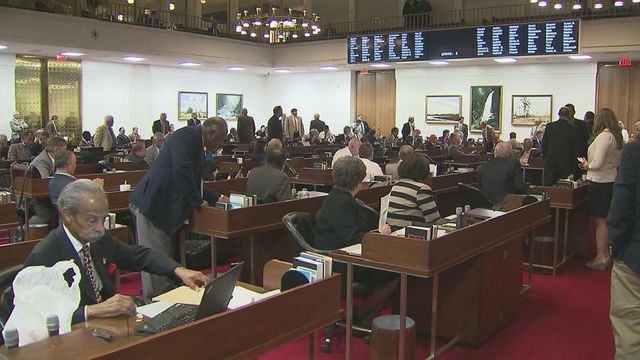House bill seeks to end execution stalemates
Doctors would no longer be required to participate in executions in North Carolina under the measure. Debate on the measure took a brief detour into completely abolishing the death penalty.
Posted — UpdatedHouse Bill 774 now goes to the state Senate for consideration.
The state has not executed a prisoner in nearly a decade due to a de facto moratorium imposed by a morass of court rulings. One of the issues involved in that deadlock has been whether a doctor needs to monitor or otherwise participate in the execution. Medical groups have said it is a breach of professional ethics for doctors to participate.
"This bill is an attempt to see if we can't take care some of the impediments as they currently exist to following the law," Rep. Leo Daughtry, R-Johnston, told his colleagues.
His proposal met with resistance from a number of quarters. In order to excuse doctors from participating in an execution, the bill would allow a physician assistant, nurse practitioner, registered nurse, emergency medical technician or paramedic to carry out some of the functions.
Rep. Gayle Adcock, D-Wake, said many of those professions had codes of ethics that prohibit participation in taking a life.
"Rep. Daughtry is putting us in a position to breach our ethical code," Adcock said, asking that nurses and physician assistants be removed from the bill. Her colleagues rejected that change.
Move to end death penalty
For a short time, an amendment by Rep. Graig Meyer, D-Orange, pushed the House into a debate over abolishing the death penalty entirely.
He drew support from one fellow Democrat, Rep. Pricey Harrison, D-Guilford, who pointed to cases where men were released from death row after being found innocent of the crimes for which they had been convicted.
"It should horrify us as a state that we might have executed someone who is innocent," Harrison said.
House Speaker Tim Moore took the unusual step of speaking against the move.
"I believe firmly that the death penalty should be an option for our prosecutors," said Moore, R-Cleveland.
Ultimately, Rep. Rick Glazier, D-Cumberland, prevailed on Meyer to withdraw his amendment.
"This is an issue that Rep. Meyer raises that we have avoided talking about for a very long time," Glazier said.
"It deserves far more vetting in the light of day," he added as the clock neared 9 p.m. during the hectic crossover period.
Bill passes
Glazier did raise objections to the bill itself. One provision would shield from public view the exact cocktail of drugs the state uses for executions.
"It is stunning and ironic we are doing this tonight," Glazier said, pointing out that the U.S. Supreme Court had, earlier in the day, reviewed three Oklahoma cases on just that topic brought in the wake of botched executions.
"We ought to at least be transparent about the method used to execute people," he said.
Moore pushed back, saying the state needs to take steps to restart executions. He pointed to the 1991 case of a David Lynch, a Gastonia man who gunned down a 12-year-old and her father.
"Nearly 25 years later, Lynch still sits on death row," Moore said, adding that it costs $34,000 a year to house him. "Justice is overdue."
Related Topics
• Credits
Copyright 2024 by Capitol Broadcasting Company. All rights reserved. This material may not be published, broadcast, rewritten or redistributed.






